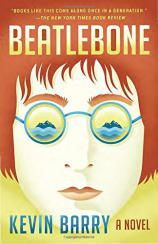Beatlebone
Review
Beatlebone
You don’t hear much about it these days, but back in the 1970s, primal scream therapy had its moment in the treatment of personal anguish. Created by the American psychotherapist Arthur Janov, who receives several mentions in Kevin Barry’s lyrical new novel, BEATLEBONE, the treatment was predicated on the belief that screaming was an effective outlet for the release of pent-up childhood trauma. The therapy’s effectiveness is now questioned, but, 40 years ago, it was almost as popular as some of the actors and musicians who embraced it.
Anyone who has ever listened to his 1970 classic “Working Class Hero,” with lyrics such as “As soon as you’re born, they make you feel small,” shouldn’t be surprised to learn that John Lennon was one of the therapy’s adherents. Repressed childhood memories appear to have vexed him throughout his life. In BEATLEBONE, Barry combines primal screaming and another fact from Lennon’s life --- his 1967 purchase of Dorinish Island off the west coast of Ireland --- to create a fictionalized account of a creatively challenging moment from late in the songwriter’s life.
"Barry combines primal screaming and another fact from Lennon’s life --- his 1967 purchase of Dorinish Island off the west coast of Ireland --- to create a fictionalized account of a creatively challenging moment from late in the songwriter’s life."
The novel is set in May 1978. Lennon is in the back of a Mercedes. He is creatively blocked, and, as Barry writes, “He’s been coming loose of himself since early in the spring.” Despite his status as one of the most famous musicians in the world, he has found fame to be “a scouring and a hollow thing” and needs to regroup. So his “fixer,” Cornelius O’Grady, is driving him to western Ireland so that Lennon can sail across Clew Bay to his island. There’s only one problem: Lennon hasn’t been to Dorinish in almost 10 years and doesn’t remember where it is.
Lennon checks into a hotel on the mainland as he waits for Cornelius, who speaks with “a very smooth timbre, deep and trustworthy like a newscaster, the bass note and brown velvet of his voice, or the corduroy of it,” to arrange passage to the island. As Lennon waits, another problem crops up: The proprietor of the hotel he’s staying in, a woman he calls Hatchet-Face, has tipped off the press about Lennon’s whereabouts. Cornelius suggests that Lennon hide at his house and give the press a couple of days to get frustrated and leave.
The move to Cornelius’ house is the first in a series of adventures during which Lennon contends not only with reporters but also with the suspicious townspeople. At Cornelius’ suggestion, Lennon slicks back his hair and lets Cornelius call him Kenneth when they enter a pub. Later, they set sail in a futile search for the island, only to discover photographers gaining on them in another boat. Cornelius then takes him to Achill Island and to the Amethyst Hotel, where Lennon meets Joe, the mysterious proprietor with “the look of an enormous forest hog,” and two young people, Frank and Sue, whose erotic activities penetrate the thin walls. In a coincidence that seems forced, the “Community of the Black Atlanteans” on Achill believes that ranting, like Lennon’s screaming, is good for the soul. “The rants bring us all the way inside,” Joe tells him.
The denizens of the Amethyst are the least interesting part of BEATLEBONE. Far more interesting are Barry’s inventive narrative structure and the poetically profane sections in which Lennon contemplates his life, especially his fraught relationship with his father. Two of the book’s nine chapters --- much is made of Lennon’s obsession with the number nine --- are written in the form of a play. Two hundred pages in, the narrative shifts from Lennon’s perspective to that of an unnamed narrator trying to piece together the story of beatlebone, Lennon’s fictional final album. There’s even a ULYSSES-like stream-of-consciousness monologue from Lennon. You’d think that the mixing of genres wouldn’t work, but the effect, in Barry’s capable hands, is hypnotic.
Near the end of the book, Barry includes an extended scene with Lennon and the sound engineer who was to work on the new album. Lennon asks the engineer about the meaning of life before answering his own question. “It’s about what you’ve got to put yourself through to make anything worthwhile,” Lennon says. “It’s about going to the dark places and using what you find there.” BEATLEBONE is a voyage into the dark by a man who, as he sang in “Working Class Hero,” “can’t really function, you’re so full of fear” and is struggling to find the way out.
Reviewed by Michael Magras on November 20, 2015
Beatlebone
- Publication Date: October 4, 2016
- Genres: Fiction
- Paperback: 320 pages
- Publisher: Anchor
- ISBN-10: 1101911336
- ISBN-13: 9781101911334





